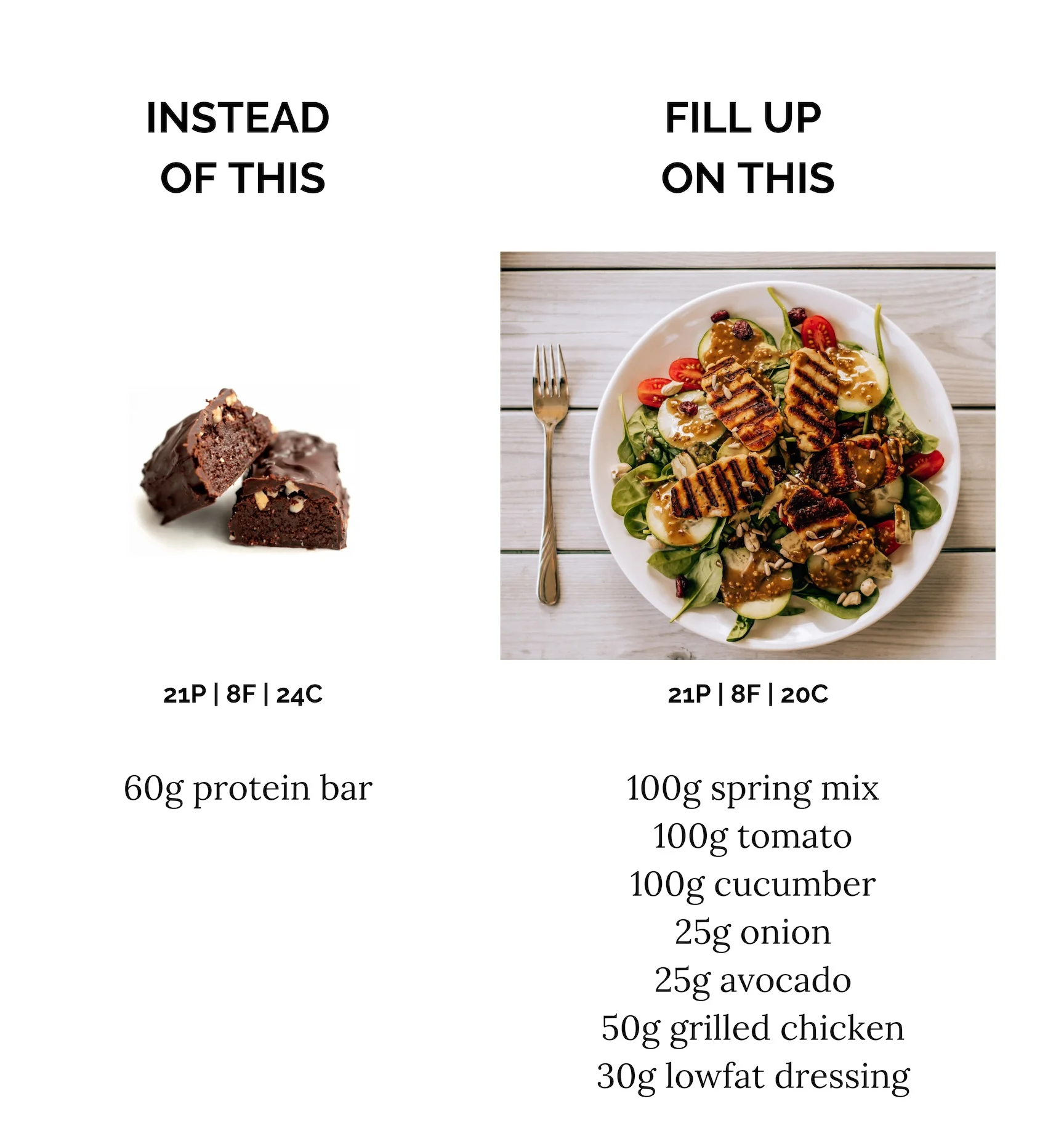Manage Hunger with High-Volume, Low-Calorie Foods
One of the biggest struggles anyone will face when dieting is hunger. If you are dieting, or eating with the goal of losing body fat, there will probably be a point where your calorie deficit grows and hunger becomes an issue.
Eating a diet that keeps you full will not only help increase your chances of successfully reaching your fat loss goals, it will also help you maintain those changes long term.
The goal of tracking your macros is to have the flexibility to eat the foods you want to eat, when you want to eat them. But while a PB&J or a donut may fit into your macros every once in a while, it may not be the best option to keep you full and satisfied throughout the day.
There are many factors that influence the satiety of a food (or how full a food will make us feel):
PROTEIN CONTENT || Foods higher in protein will keep us feeling full longer, especially if the protein is from whole food sources rather than supplements. Examples: chicken, steak, tuna, eggs, nonfat greek yogurt.
FIBER CONTENT || Foods higher in fiber are generally high in volume and require more energy to eat and digest, keeping us full longer. Examples: berries, leafy greens, beans, lentils, quinoa.
WATER CONTENT || Foods high in water content are high in volume while providing fewer calories. Just as drinking a glass of water before each meal can help you stay full, eating foods high in water content can also help with satiety. Examples: watermelon, cucumbers, celery, lettuce, grapefruit, cauliflower.
FOOD COMPOSITION || While protein shakes and breakfast smoothies are convenient, they are not always the most satiating option. Choosing solid whole foods over liquid calories can help you stay full longer, even when you’re eating the same amount of macros. Example: try a post-workout banana rather than post-workout gatorade
These different factors are why, whole, nutrient-rich foods like fruits, vegetables, whole grains, and lean proteins will keep you full longer than fast food or processed foods, even when they may have similar caloric value.
A protein bar can be a great option for packing in some protein when you are on the go. But while protein content is a factor in high satiety foods, protein bars can also be high in fat and carbs while providing little volume.
A typical protein bar has about 21P | 8F | 24C for 60 grams of food. It’s high in protein, but higher in carbs for a small amount of food. A high-volume alternative to a protein bar could be steak and sweet potatoes, a chicken salad with dressing, or a tuna salad with veggies and light mayo on a sandwich thin or rice cakes. These alternatives have approximately the same macros but are higher in fiber, high in protein from whole foods, and add in veggies that are high in water content to add even more volume.
So, how do you stay full even when your calorie or macro goals are low?!
1 | Substitute high-volume options for typically calorie-dense foods. Have cauliflower rice instead of normal rice; substitute high fiber sandwich thins in place of normal bread; use cottage cheese in place of salad dressing to cut down on fat and provide more volume and more protein.
2 | Add high volume veggies to every meal. Add mushrooms and zucchini to your eggs in the morning; add celery and carrot sticks to your snack or lunch; pair dinner with a big salad made with leafy greens and chopped veggies.
3 | Stay hydrated. Drink water before each meal and all throughout the day. You can also stay hydrated with tea, sparkling water or diet sodas, and zero-calorie additives like Mio or Crystal Light.
If you have fat loss goals, it will be hard to stick to them if you are constantly battling hunger. Shifting some of your normal food choices to high volume alternatives can help reduce hunger and keep you consistent in working towards your goals.
Sign up for my weekly email and get fluff-free inspiration in your inbox every Friday. Recipes, troubleshooting and no-nonsense nuggets to help you swap out restrictive dieting for fun, flexible and effective nutrition.

